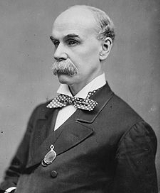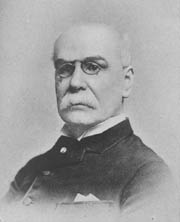
William Pinkney Whyte
Encyclopedia
William Pinkney Whyte a member of the United States Democratic Party
, was a politician who served the State of Maryland as a State Delegate
, the State Comptroller
, a United States Senator
, the 35th Governor
, the Mayor of Baltimore, Maryland, and the State Attorney General
.
, had been a famous United States
politician, administrator, and diplomat.
Whyte's early education involved instruction by a private tutor, who had been personal secretary to Napoleon Bonaparte. From 1842-1844, Whyte was unable to attend college as a result of his family's poor financial situation, and began work at the banking firm of Peabody, Riggs and Co. in Baltimore. He began to study law in Baltimore at the law office of Brown and Brune for one year before being admitted to the law school of Harvard University
in 1844. Whyte returned to Baltimore in 1845 for further study, and was admitted to the Bar
soon after in 1846.
of the State Treasury of Maryland, for which he was credited for introducing a more simplified financial system to the State.
 In 1857, Whyte was again nominated to serve in Congress. He was defeated, but brought forth evidence before the House of Representatives
In 1857, Whyte was again nominated to serve in Congress. He was defeated, but brought forth evidence before the House of Representatives
of fraud and corruption regarding the election. The House did not concur on whether or not he should have been appointed, however.
After nearly a decade out of the political arena, Whyte was asked by then-governor Thomas Swann
to fill the remainder of resigning senator Reverdy Johnson
's term from July 13, 1868 to March 3, 1869. During his short tenure as senator, Whyte steadfastly supported the embattled President
Andrew Johnson
, and also supported easing the tension on the Southern states during Reconstruction. He chose not to be a candidate for re-election in 1868, however.
In 1872, Whyte was elected Governor of Maryland, defeating Republican challenger Jacob Tome
. In the election of 1874, Whyte was elected by the legislature as a Democrat to the United States Senate and accordingly resigned from the position of Governor. In 1874, in between his terms as governor and senator, he served as counsel for Maryland before the arbitration board in the boundary dispute between Virginia
and Maryland. During this tenure as senator, Whyte opposed paying the nation's debt with silver and gold instead of solely gold, and served as the chairman of the U.S. Senate Committee on Printing (46th Congress). In the election of 1880, Whyte chose not to run for re-election, due to family illness and strife between him and his counterpart senator, Arthur P. Gorman.
Whyte was elected unopposed to be mayor of Baltimore in 1881. At the conclusion of his term in 1883, Whyte chose to go back to practicing law. From 1887-1891, Whyte was Attorney General of Maryland, and from 1900–1903, the Baltimore City Solicitor. In 1906, Whyte was appointed by Maryland Governor Edwin Warfield
to fill the Senate seat vacancy caused by the death of Arthur P. Gorman.
Whyte served as senator until his unexpected death in Baltimore, and is buried in Greenmount Cemetery
.
Democratic Party (United States)
The Democratic Party is one of two major contemporary political parties in the United States, along with the Republican Party. The party's socially liberal and progressive platform is largely considered center-left in the U.S. political spectrum. The party has the lengthiest record of continuous...
, was a politician who served the State of Maryland as a State Delegate
Maryland House of Delegates
The Maryland House of Delegates is the lower house of the General Assembly, the state legislature of the U.S. state of Maryland, and is composed of 141 Delegates elected from 47 districts. The House chamber is located in the state capitol building on State Circle in Annapolis...
, the State Comptroller
Comptroller
A comptroller is a management level position responsible for supervising the quality of accounting and financial reporting of an organization.In British government, the Comptroller General or Comptroller and Auditor General is in most countries the external auditor of the budget execution of the...
, a United States Senator
United States Senate
The United States Senate is the upper house of the bicameral legislature of the United States, and together with the United States House of Representatives comprises the United States Congress. The composition and powers of the Senate are established in Article One of the U.S. Constitution. Each...
, the 35th Governor
Governor of Maryland
The Governor of Maryland heads the executive branch of the government of Maryland, and he is the commander-in-chief of the state's National Guard units. The Governor is the highest-ranking official in the state, and he has a broad range of appointive powers in both the State and local governments,...
, the Mayor of Baltimore, Maryland, and the State Attorney General
Attorney General
In most common law jurisdictions, the attorney general, or attorney-general, is the main legal advisor to the government, and in some jurisdictions he or she may also have executive responsibility for law enforcement or responsibility for public prosecutions.The term is used to refer to any person...
.
Early life and education
Whyte was born in Baltimore, Maryland, the son of Joseph and Isabella White (he later changed his surname to Whyte following a family disagreement). His grandfather, William PinkneyWilliam Pinkney
William Pinkney was an American statesman and diplomat, and the seventh U.S. Attorney General.-Biography:Born in Annapolis, Maryland, Pinkney studied medicine and law, becoming a lawyer after his admission to the bar in 1786...
, had been a famous United States
United States
The United States of America is a federal constitutional republic comprising fifty states and a federal district...
politician, administrator, and diplomat.
Whyte's early education involved instruction by a private tutor, who had been personal secretary to Napoleon Bonaparte. From 1842-1844, Whyte was unable to attend college as a result of his family's poor financial situation, and began work at the banking firm of Peabody, Riggs and Co. in Baltimore. He began to study law in Baltimore at the law office of Brown and Brune for one year before being admitted to the law school of Harvard University
Harvard University
Harvard University is a private Ivy League university located in Cambridge, Massachusetts, United States, established in 1636 by the Massachusetts legislature. Harvard is the oldest institution of higher learning in the United States and the first corporation chartered in the country...
in 1844. Whyte returned to Baltimore in 1845 for further study, and was admitted to the Bar
Bar (law)
Bar in a legal context has three possible meanings: the division of a courtroom between its working and public areas; the process of qualifying to practice law; and the legal profession.-Courtroom division:...
soon after in 1846.
Political career
From 1847-1849, Whyte served one term as a member of the Maryland House of Delegates. In 1850, Whyte was unsuccessful in a bid for election to the 32nd Congress. From 1853-1855, he served one term as ComptrollerComptroller
A comptroller is a management level position responsible for supervising the quality of accounting and financial reporting of an organization.In British government, the Comptroller General or Comptroller and Auditor General is in most countries the external auditor of the budget execution of the...
of the State Treasury of Maryland, for which he was credited for introducing a more simplified financial system to the State.

United States House of Representatives
The United States House of Representatives is one of the two Houses of the United States Congress, the bicameral legislature which also includes the Senate.The composition and powers of the House are established in Article One of the Constitution...
of fraud and corruption regarding the election. The House did not concur on whether or not he should have been appointed, however.
After nearly a decade out of the political arena, Whyte was asked by then-governor Thomas Swann
Thomas Swann
Thomas Swann was an American politician. Initially a Know-Nothing, and later a Democrat, he served as mayor of Baltimore , as the 33rd Governor of Maryland , and as U.S...
to fill the remainder of resigning senator Reverdy Johnson
Reverdy Johnson
Reverdy Johnson was a statesman and jurist from Maryland.-Early life:Born in Annapolis, Johnson was the son of a distinguished Maryland lawyer and politician, John Johnson . He graduated from St. John's College in 1812 and then studied law...
's term from July 13, 1868 to March 3, 1869. During his short tenure as senator, Whyte steadfastly supported the embattled President
President of the United States
The President of the United States of America is the head of state and head of government of the United States. The president leads the executive branch of the federal government and is the commander-in-chief of the United States Armed Forces....
Andrew Johnson
Andrew Johnson
Andrew Johnson was the 17th President of the United States . As Vice-President of the United States in 1865, he succeeded Abraham Lincoln following the latter's assassination. Johnson then presided over the initial and contentious Reconstruction era of the United States following the American...
, and also supported easing the tension on the Southern states during Reconstruction. He chose not to be a candidate for re-election in 1868, however.
In 1872, Whyte was elected Governor of Maryland, defeating Republican challenger Jacob Tome
Jacob Tome
Jacob Tome was an American philanthropist, politician, and the founder of the Tome School.-Biography:...
. In the election of 1874, Whyte was elected by the legislature as a Democrat to the United States Senate and accordingly resigned from the position of Governor. In 1874, in between his terms as governor and senator, he served as counsel for Maryland before the arbitration board in the boundary dispute between Virginia
Virginia
The Commonwealth of Virginia , is a U.S. state on the Atlantic Coast of the Southern United States. Virginia is nicknamed the "Old Dominion" and sometimes the "Mother of Presidents" after the eight U.S. presidents born there...
and Maryland. During this tenure as senator, Whyte opposed paying the nation's debt with silver and gold instead of solely gold, and served as the chairman of the U.S. Senate Committee on Printing (46th Congress). In the election of 1880, Whyte chose not to run for re-election, due to family illness and strife between him and his counterpart senator, Arthur P. Gorman.
Whyte was elected unopposed to be mayor of Baltimore in 1881. At the conclusion of his term in 1883, Whyte chose to go back to practicing law. From 1887-1891, Whyte was Attorney General of Maryland, and from 1900–1903, the Baltimore City Solicitor. In 1906, Whyte was appointed by Maryland Governor Edwin Warfield
Edwin Warfield
Edwin Warfield , a member of the United States Democratic Party, was the 45th Governor of Maryland in the United States from 1904 to 1908.-Early life:...
to fill the Senate seat vacancy caused by the death of Arthur P. Gorman.
Whyte served as senator until his unexpected death in Baltimore, and is buried in Greenmount Cemetery
Greenmount Cemetery
Green Mount Cemetery is a historic cemetery in Baltimore, Maryland, United States. Established on March 15, 1838, and dedicated on July 13, 1839, it is noted for the large number of historical figures interred in its grounds as well as a large number of prominent Baltimore-area families...
.
Further reading
- Tracy Matthew Melton, Hanging Henry Gambrill: The Violent Career of Baltimore's Plug Uglies, 1854-1860 (2005). Includes information on Whyte's early legal and political careers.

